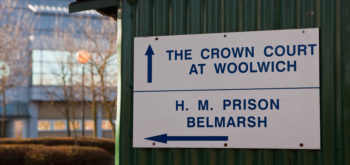In a Young Legal Aid Lawyers (YLAL) webinar on Wednesday (called ‘Open justice and remote trials in the criminal justice system during Covid-19’), lawyers Kirsty Brimelow QC, Anna Renou and the Secret Barrister, alongside Penelope Gibbs from Transform Justice, expressed various concerns over how the criminal justice system is currently operating. Billie Tomlinson reports.
The case of Marie Dinou, who was detained in police cells for two nights and convicted of a non-existent offence after being found ‘loitering between platforms’ at a train station, was used as an example of why open justice is so crucial in the current legal context.
Barrister Kirsty Brimelow QC began by explaining the two key pieces of coronavirus legislation. The Coronavirus Act 2020, which gives powers to constables to help public health officials where somebody is potentially infectious has nothing to do with restrictions on movement which are dealt with by the Health Protection (Coronavirus Restrictions) Regulations 2020.
As a form of secondary legislation, the purpose of these regulations under the parent act is for preventing, protecting, controlling, and providing a public health response to the spread of infection. According to Kirsty Brimelow QC, they are widely drafted and vague, which has led to confusion on behalf of the police who, in trying to enforce them, have been misapplying them leading to unlawful detentions.
This is the background to Dinou’s case and the context in which concerns have been raised over the lack of open justice.
Marie Dinou’s case was heard at North Tyne Magistrates court which was technically still open to the public but for all practical purposes, considering the lockdown, was inaccessible to both the public and to journalists. No one was able to ask any questions until the British Transport Police put up a press release on their website.
Which poses questions over how many similar cases are going unreported and whether the same is happening with the fixed penalty notices being issued to people in parks and on streets.
According to Gemma Hewison, crime programme director at HM Court and Tribunal Service, advance requests for third parties, including journalists, to watch remote hearings were being facilitated. Penelope Gibbs from Transform Justice however, complained that she had been trying for five weeks to access hearings and was unaware of any members of the public being allowed to observe cases.
Panellists expressed concern that this lack of public scrutiny at a time when there is increasing criminalisation of members of the public is being compounded by the effects of remote justice, with the welfare of the defendant and their access to confidential legal advice not being sufficiently considered.
Anna Renou, a solicitor at ITN, described the tech-related difficulties she encountered at police stations and magistrates’ courts. A joint protocol put together in April about how police interviews should be conducted during the pandemic had prioritised advice in interviews taking place remotely. In order for this to happen at police stations there needs to be a custody laptop available. Anna Renou explained that she had not had a single interview where there had been a custody suite laptop. Instead, instructions had had to be taken over the telephone raising concerns over confidentiality since booth phones at police stations are in the custody suites themselves and within earshot of the police.
The Secret Barrister also highlighted concerns over the fact that the initial guidance on Covid-19 published by the Ministry of Justice made no reference to defendants ‘as if they do not exist’.
In light of these concerns, Penelope Gibbs called for more research to be done on the effects of remote hearings more broadly and how they may fundamentally undermine the credibility of the justice system for those who are involved in it including the defendants themselves.







